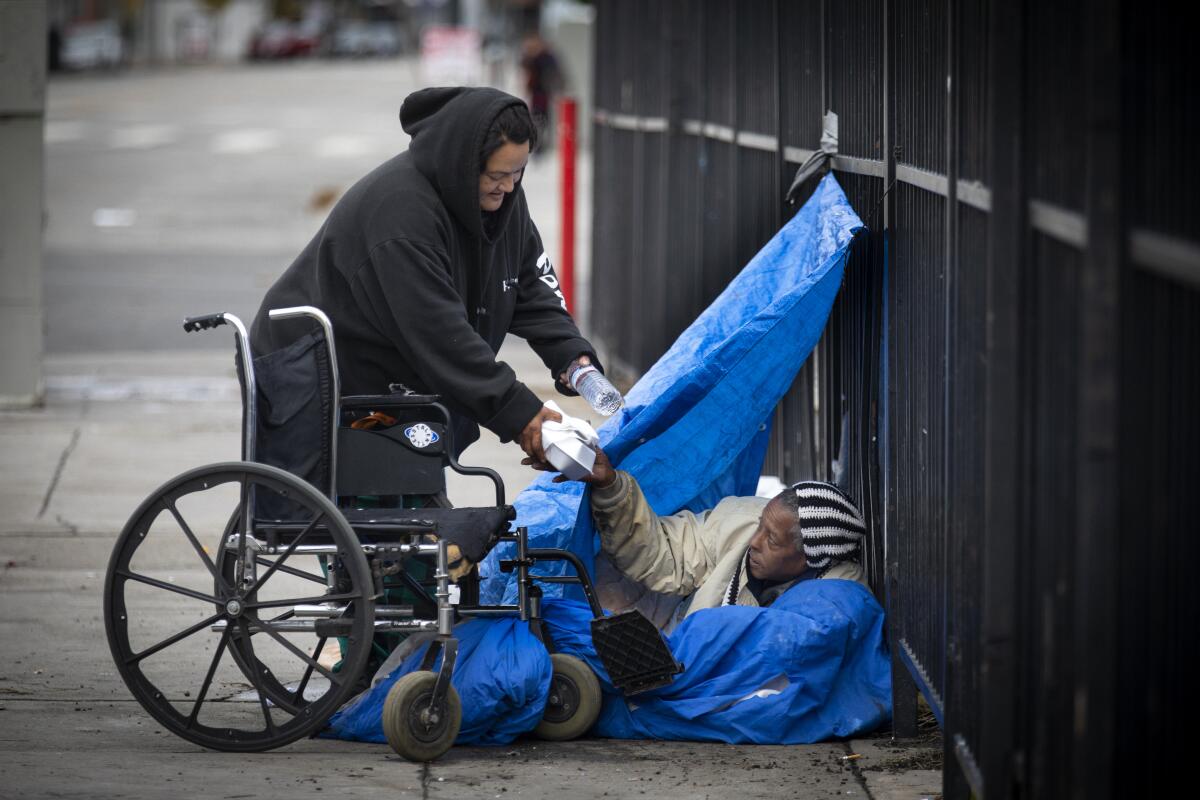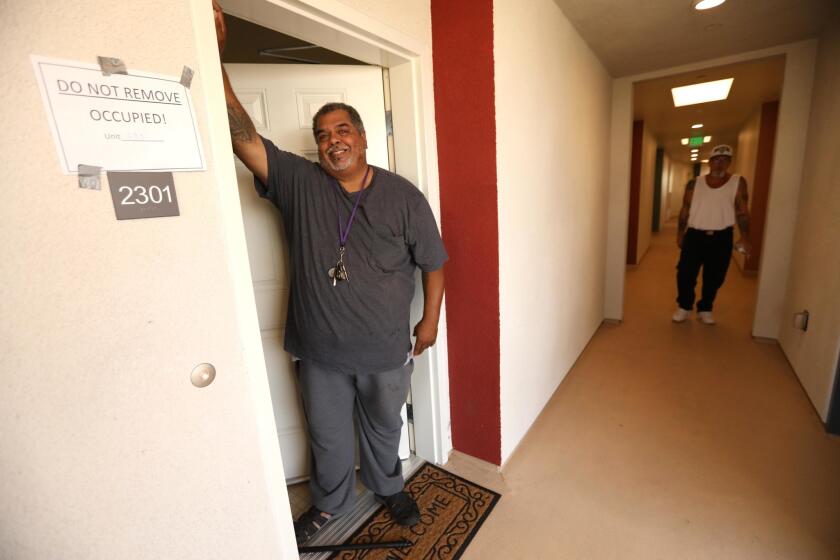L.A. officials are getting serious about overhauling this top homeless services agency

- Share via
Given its name, it’s not surprising that many view the Los Angeles Homeless Services Authority as a one-stop shop for solving the county’s homelessness crisis.
Yet it’s the Los Angeles County Department of Health Services that tends to people on the streets with physical ailments and the Department of Mental Health that serves mentally ill homeless people. And it’s the city that has taken the responsibility of building permanent supportive housing, and it’s the county that funds the services. And the U.S. Department of Veterans Affairs that works with homeless veterans.
The reality is, the agency known as LAHSA doesn’t control many of tools that help people get off the streets and into housing.
Created in 1993, it was given limited powers and an even more limited mission of stopping the city and county from bickering over federal dollars for homeless housing and services. Yet its inability to live up to the public’s lofty expectations — coupled with the county’s skyrocketing homeless population — has led to a growing consensus that the agency needs to be retooled.
Few can say what LAHSA should become or how it should get there, though.
“Is this the best system?” asked Miguel Santana, the former Los Angeles City administrative officer who crafted the city’s homeless plan. “What are the outcomes that we’re collectively monitoring and trying to achieve?”
But the overarching question, Santana said, is, “Who is in charge?”
The answer is complicated — and the resignation of longtime executive director Peter Lynn in late 2019, has only added urgency to the question as the agency continues its search for a successor.
By design, LAHSA sits at the center of a diffused, countywide homeless system. It has six political bosses — the five members of the L.A. County Board of Supervisors and Mayor Eric Garcetti — who rarely seek guidance from the agency on how to implement homeless initiatives.
LAHSA’s power also overlaps with that of city and county departments that have their own mandates to deal with the effects of homelessness, and with activist groups and nonprofits that carry influence over homeless policy.
It’s ridiculous that some homeless housing units sit empty because of a bureaucratic process. Time to change that.
While LAHSA’s staff has more than quadrupled along with its budget, driven by an infusion of hundreds of millions in local tax dollars, it remains steeped in a rigid culture of federal compliance and saddled with a structure that gives it little power to guide local policy. Internally, LAHSA’s governance is fractured with multiple commissions and boards and councils in charge of various and sometimes competing tasks.
Besides the 10-member commission that is nominally in charge, there is a 17-member board required by the federal government to evaluate and recommend policies for federal funding. That board was created in 2017 by the 56-member Los Angeles Regional Homeless Advisory Council, which LAHSA and the United Way of Greater Los Angeles set up to provide a forum for “collaborative and strategic leadership on homelessness.”
“We’re trying to solve homelessness by committee,” said Mike Arnold, who led LAHSA for nearly nine years before Lynn took over and looks back on his time there as the most trying of his career. “There is everyone and no one who is responsible for what goes on as it relates to homelessness in L.A. County.”
What does change look like?
To make changes at LAHSA, both the L.A. County Board of Supervisors and the L.A. City Council would have to agree on the specifics to restructure it, as the agency was created through a joint-powers agreement between the two elective bodies.
Already the supervisors have moved to review the agency’s governance structure. In January, City Council President Nury Martinez introduced a motion to start a similar process.
Separately, a five-member internal committee has been created to spend the next several months examining LAHSA’s mission. In an interview, LAHSA’s chairwoman, Sarah Dusseault, said that the committee’s agenda is to more clearly define the agency’s role in the larger local homelessness system of government agencies and nonprofits, and then figure out what changes are needed to give it the authority needed to do its job. Any reorganization, she said, should be aimed at improving communication among service providers and at supplying better data to make the whole system more transparent and accountable.
Other ideas are more radical.
Santana, for example, has floated the idea of reconfiguring LAHSA’s governing commission to be more like L.A.’s Metropolitan Transportation Authority to improve performance. The MTA is made up primarily of elected officials, including from several smaller cities in addition to L.A. city and county. LAHSA’s commission consists only of appointees — one each by each member of the L.A. County Board of Supervisors and five by the mayor of Los Angeles.
Supervisors Kathryn Barger and Hilda Solis, who led a vote earlier this month to review LAHSA, say Santana’s suggestion is one way to address complaints they hear from constituents that LAHSA is unresponsive to smaller cities.
However, Supervisor Sheila Kuehl said she is wary of proposals that could amount to rearranging the deck chairs on the Titanic.
“I do not believe that LAHSA needs to significantly change its structure,” Kuehl said.
For others, the solution is not to fix LAHSA but to replace it with a muscular new agency. It would be designed from scratch to play a central role in setting homeless policy, raising funds, building shelters and housing, and possibly even assuming some control over zoning laws.
Such a change would require a heavy political lift, as it would depend on the supervisors and mayor agreeing to cede a degree of power and possibly on the passage of new state legislation. There also likely would be opposition.
The United Way of Greater Los Angeles, the mega charity that has taken a lead in driving local homeless policy, has put out feelers to gauge support for creating a new agency. But it has as yet to announce any specifics.
Meanwhile, Dusseault said she is encouraged that members of both the Board of Supervisors and the City Council have said they want to work together to find a comprehensive solution.
“That is fantastic because it just means even more support for really taking a hard look at where the problems are,” she said.
The path forward
In the coming months, Dusseault’s committee will build on a year-long assessment conducted by Clutch Accounting Group, a Houston-based homeless consulting firm.
Outlining the findings in December, Clutch managing partner Mandy Chapman Semple proposed that LAHSA stick to what it does best — administering street outreach, getting homeless people into shelters and permanent housing, and collecting data to evaluate how well the system is running. Broader issues of providing housing and addressing the economic causes of homelessness should be left to political leaders, she said.
Though the thrust of Clutch’s plan would define LAHSA’s role more narrowly — as an operational rather than policy agency — that won’t be easy to achieve. It would require LAHSA to gain some new measure of control over the current homeless outreach system, which is made up of agencies from all levels of government and dozens of nonprofits.
Wendy Greuel, a former City Council member who is on LAHSA’s internal committee, has urged the agency “to assume that role and for other people to allow us to assume that role.”
A test of how that might work has been under way since December, when managers from several county departments, city and county housing authorities, and the Department of Veterans Affairs assembled in LAHSA’s downtown headquarters — dubbed the Central Command — to tackle a backlog of housing vacancies.
Apartments in subsidized housing developments can inadvertently remain vacant when the homeless person selected to move in goes missing or loses crucial documents. Other times, poor communication can complicate matters, when outreach workers from one agency aren’t made aware of an open apartment that’s listed in another agency’s system.
“There’s data that they have that they’re not sharing,” Dusseault said. “There are vacancies that need to be filled. It’s taking too long.”
The Central Command has evolved into daily meetings of staff from several agencies — modeled after the multi-jurisdictional “emergency response” meetings that typically happen after hurricanes and other natural disasters.
Together, they are designing a new system to collect data each day on each agency’s list of vacant apartments and homeless clients, all in the hope of tracking and eliminating bottlenecks. The next step, starting this month, will be to assemble the agencies’ field teams to conduct an on-the-ground test.
But the Central Command and its meetings are based only on goodwill. The other agencies can stop cooperating with each other and LAHSA at any time.
Garcetti said he is not averse to ceding some authority, with LAHSA in a new, more operational role. But he predicted there could be complications with local police departments, and large city and county departments having to take direction from LAHSA.
“So we have to figure out first and foremost what we’re willing to demand of our agency heads,” Garcetti said.
Garcetti said he thinks it’s important for LAHSA to get a strong leader who can act as a “kind of a field marshal.” And soon.
“Right leaders can sometimes solve these problems,” he said. “So I do think it’s the most important hire for Los Angeles in 2020 by far.”
The commission’s executive search committee is not acting in haste. They’ve spent two months selecting a search firm before formally defining the job. Greuel said she is looking for someone who would be more assertive than Lynn, a lifetime bureaucrat.
“Everyone, electeds and others, are looking for someone to tell them what to do and give them that direction and kind of say, ‘OK, LAHSA says this is the way we need to go,’” she said.
More to Read
Sign up for Essential California
The most important California stories and recommendations in your inbox every morning.
You may occasionally receive promotional content from the Los Angeles Times.









